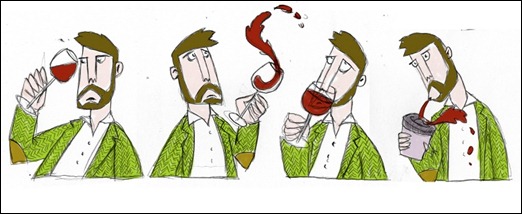Maleducato Posted by Serena on Apr 12, 2013 in Italian Language
A couple of weeks ago we looked at greetings, adjectives, nouns and idiomatic expressions constructed with the adverb bene (well/good). Today we are going to look at words built with the opposite adverb male (badly):
maleducato/a/i/e – male plus educare (to educate) = badly-behaved, ill-mannered: Giorgio è un bambino proprio maleducato (Giorgio is a really badly-behaved child)
malaccetto/a/i/e – male plus accettare (to accept) = unwelcome: l’offerta è stata malaccetta (the offer was unwelcome)
malintenzionato/a/i/e – male plus intenzionato (to have the intention) = immoral/degenerate/evil: in questo quartiere ci sono molte persone malintenzionate (in this district there are many immoral/degenerate/evil people)
maldestro/a/i/e – male plus destro (skilful) = awkward/clumsy: Giorgio è sempre così maldestro col vino (Giorgio is always so awkward/clumsy with the wine)
malaugurato/a/i/e – male plus augurare (to cast an omen) = ill-fated: è stato un malaugurato incontro (it was an ill-fated meeting)
malfermo/a/i/e – male plus fermo (still) = unstable: la sedia ha le gambe malferme (the legs of the chair are unstable)
malandato/a/i/e – male plus andare (to go) = in bad shape: quella macchina è proprio malandata (that car is really in bad shape)
malcelato/a/i/e – male plus celare (to conceal/to hide) = ill-concealed: l’hai detto con malcelata soddisfazione (you couldn’t hide your satisfaction when you said it)
maligno/a/i/e – male plus Latin ‘gignere’ (to generate) = malicious, evil: è un uomo maligno (he’s a malicious man)
maledetto/a/i/e – male plus dire (to say) = cursed, damned: maledetta questa grandine, ha rovinato la vendemmia! (damn this hail, it’s ruined the grape harvest!)
malfatto/a/i/e – male plus fare (to make/to do) = badly made/done: questo lavoro è malfatto (this work is badly done)
malato/a/i/e – male plus Latin habitus from habere (to have) = ill: molti scolari sono malati oggi (today many pupils are ill)
malsano/a/i/e – male plus sano (healthy) = unhealthy: qui si respira un’aria malsana (the air here is unhealthy to breath)
malincuore – male plus in cuore (in heart); mostly used in the expression “a malincuore” = reluctantly: ho accettato l’incarico a malincuore (I accepted the responsibility reluctantly)
malessere – male plus essere (to be) = indisposition/illness: dopo cena Giorgio ha avvertito un leggero malessere (after dinner Giorgio felt a bit unwell)
Latin also has the adjective malus, mala (bad, ill), which in Italian has been substituted by the adjective cattivo/a. However remnants of this adjective can been found in some compound nouns such as:
malaria – mala plus aria (air) = malaria: un tempo in Maremma si moriva di malaria (once upon a time in Maremma people used to die from malaria)
malavita – mala plus vita (life) = underworld; often shortened to “mala”: si dice che quell’avvocato sia legato alla malavita della città (they say that that lawyer is linked to the city underworld)
malocchio – malo plus occhio (eye) = evil eye: tutte queste disgrazie sono certamente opera di un malocchio (all these misfortunes are certainly the work of an evil eye)
malora – mala plus ora (hour) = ruin; mostly used in the expression “andare in malora” (to go to ruin): l’azienda sta andando in malora (the firm is going to ruin)
malavoglia – mala plus voglia (will) = unwillingness; mostly used in the expression “di malavoglia” = unwillingly: Maria fa i compiti di malavoglia (Maria does her homework unwillingly)

Build vocabulary, practice pronunciation, and more with Transparent Language Online. Available anytime, anywhere, on any device.






Leave a comment: